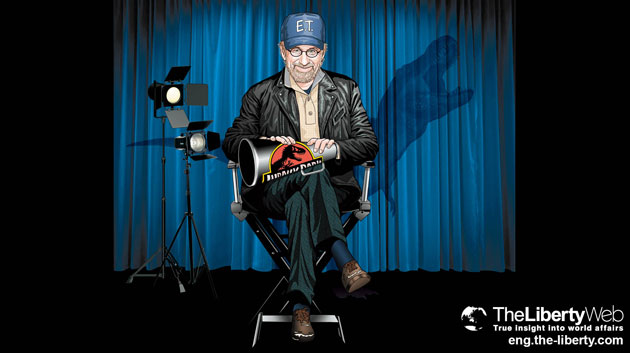Steven Spielberg: The Lives of the Creative Warrior
Humans are eternal beings that undergo reincarnation to polish their souls and improve themselves. This process of reincarnation becomes a unique story for each individual personality. The spiritual investigations into the reincarnations of renowned people will bring into light the secret to this long process of soul polishing.
Achieves Unification
Steven Spielberg
Born in 1946 to Ukrainian Jewish parents in Ohio, U.S., Spielberg began making his own films with his father’s 8mm camera at a young age. Currently he is a highly acclaimed filmmaker who continues to astound and revolutionize the film world with new ideas and cinematography.
Spielberg’s longtime collaborator, Harrison Ford, once said that Spielberg was “born to be a director”. The sheer number of box office hits he has created – Jaws, Indiana Jones, Jurassic Park – is truly exceptional.
According to spiritual research by Master Ryuho Okawa, founder of Happy Science, Spielberg’s past life was Emperor Gaozu of Han, the man who united ancient China by founding the Han dynasty. On the surface the two people seem somewhat unrelated, but a closer look at their characteristics will unveil the source of Spielberg’s creative power.
Today, Hollywood films are world phenomena. People in countries such as Japan can go to the cinema and watch them without any particular awareness that it is actually American, and therefore foreign.
In 2015, the North American film industry revenue was US$11.1 billion. Comparing this to Japan’s US$1.8 billion, we can see just how big it is.
Hollywood is also spreading American values throughout the world. As Spielberg said, “Every time I go to a movie, it’s magic, no matter what the movie’s about”. Hollywood films can move people, and as a result the people are becoming enamoured by America.
For instance Spielberg’s 2015 film “Bridge of Spies” is based on a true story of a Soviet KGB spy and an American lawyer. Tom Hanks plays the protagonist who tries to protect the rights of a Soviet spy to stand trial in the U.S. The film reminds us of the importance of the security of freedom and rights under the U.S. Constitution.
Films are a kind of weapon, albeit different to military and economic power. This weapon has allowed the American film industry to dominate the world.
Now looking at Emperor Gaozu. He lived at a time of revolt against oppression after the death of the last Emperor of the Qin dynasty. Gaozu established himself as a hero amongst those fighting against the Qin. He defeated a fellow rebel warlord, Xiang Yu, and united the regions to establish the Han dynasty.
Popularity Is Principle
Even before his great feats, Gaozu was a chivalrous man who attracted followers wherever he went. Seeing his power to attract people, the Qin regional officials begged him to become a town official responsible for policing and transportation of goods.
At the time the laws were such that those who opposed the Qin’s orders were sentenced to death. Gaozu was ordered to commandeer 100 laborers, but many escaped due to scanty hopes that they would ever return to their homeland again. In the end Gaozu got sick and tired of this and escaped with them, hiding in the marshes.
The Qin opposition began to form a rebel army, and in Gaozu’s hometown people began to encourage joining the rebels, with the ever-popular Gaozu as their leader. Thus he became their leader.
In contrast to the Qin’s complex and detailed laws, Gaozu only instigated three simple rules: do not kill, do not steal, and do not hurt others. All of the laws built upon this foundation allowed people to live in freedom, which became highly popular amongst the people.
Popularity is also behind Spielberg’s rise to his current influence in the world as a Hollywood director.
In the 1970’s, around the time Spielberg made his debut, becoming a director in the film industry was all about making films that the producers liked. Spielberg, who was 28 at the time, directed “Jaws”, which went from being a film heavy on story and characters aimed at a professional audience, to an entertainment sensation film.
“The audience was my partner in making Jaws”, Spielberg said regarding his 1975 film. “I always like to think of the audience when I am directing. Because I am the audience.”
The effective music used when the shark is approaching and the bold plot twists grip the audience, and the quality has risen with every film since; his films have expanded the market.
But Spielberg’s films aren’t popular just for being sensational and entertaining. He has also made many historical films with heavy substance, like “Schindler’s List”, the story of a German industrialist who helped Jews escape from the Nazis, and “Lincoln” depicting the last 4 months of the life of President Abraham Lincoln.
These above two works, especially, are stories of heros who save the people from a grand malicious power. His ability to depict these stories with conviction probably comes from experiences from his past life of emancipating people from oppression.
The Power of a Holistic Producer
Usually heroes are those with dauntless courage and strength in battle. Gaozu, however, was a ‘weak’ warlord who lost many times to his rival Xiang Yu. The reason for his ultimate victory is because of his vision of unification, and the power of being a holistic ‘producer’: having the right grand strategies despite numerous losses in smaller battles.
After Gaozu defeated the capital of the Qin dynasty, Xianyang, he overcame his greed for the women and treasures within the castle, and prohibited plundering. He stationed his camp outside of the city.
Gaozu took the Qin Emperor Ziying under his protection to enable the Qin people to side with him, in preparation for his battle with Xiang Yu. It stands in stark contrast to Xiang Yu who later invaded the city, killed the Emperor and his followers, burnt the palace, and ransacked the first Emperor’s tomb to take the treasures.
The battle-strong Xiang Yu pushed Gaozu out of the city to a remote region, but not before he succeeded in protecting the granary, which was to become a strategic point for his unification plan. The help of the people and the fertile land, full of food resources, allowed him to secure supplies, and became an asset in his resurgent battle.
Spielberg is also a master at winning through strategic forward planning.
At the time when Spielberg made “Jaws”, films usually started in one large cinema, and only if they were considered a hit did other cinemas decide to show them. With “Jaws”, however, Spielberg broke this tradition with heavy advertising and premiering at all 3,000 American cinemas simultaneously. It naturally made its way into the spotlight and became a huge hit.
He did something even more radical with the first “Indiana Jones” film. He demanded that the entertainment company take the full burden of production costs with a 50-50 split of the profit. “Indiana Jones” was another huge box office hit.
With subject films about aliens, such as “Close Encounters of the Third Kind”, Spielberg incorporated ideas from his producers, and signed a contract with the entertainment company to share profits made from company-related merchandise such as T-shirts, magazines and books.
It is not surprising then that film critic John Baxter would compare Spielberg’s vision to that of a politician or entrepreneur.
Discovering Talent and Drawing It Out
Gaozu is famous for being able to find, appoint, and use highly skilled people. One of his military generals Han Xin once said, “Xiang Yu could make 1,000 people bow down to him if he wanted to, but he isn’t able to trust his skilled subordinates . . . But Gaozu knows how to use warriors of God-given skill, and rewards the best of them by giving them land.”
This Han Xin originally served Xiang Yu, but was never given any prominent tasks, so he switched to Gaozu. Here also, he failed to attain a desirable position, and left. But Gaozu’s strategist Xiao He, abandoning his jobs, went to find Han Xin and call him back. Seeing Xiao He’s faith in Han Xin, Gaozu accepted his strategist’s idea and made Han Xin into a military general.
This decision turned out to be right. Han Xin later had a winning streak in battles, and later becomes a great contributor to Gaozu’s victory. Clearly, Gaozu was an unconventional man: no other person in history has ever entrusted a deserter with the post of military general.
Zhang Liang, one Gaozu’s advisors, was another man who was moved by Gaozu’s broad-mindedness. No one was listening to Zhang Liang when he went around to military generals telling them about his strategies, until he came to Gaozu. Gaozu listened to Zhang Liang with great fervor, and realized that his strategy was very useful. He accepted Zhang Liang’s ideas and plans, and carried out many of them.
The same characteristic can be seen in Spielberg. Many actors, producers and scriptwriters who Spielberg admired for their talent, have gone on to become successful.
For instance, it was Spielberg who first discovered Robert Zemeckis, the director of “Back to the Future”, when he was still unknown. Spielberg found talent in the college student Zemeckis, read his script and approached a distributing agency saying that Zemeckis should also direct the script. Actor Harrison Ford has commented that he discovered many of his true talents when he met Spielberg; film producer Dennis Hoffmann has said that Spielberg has a way of making people feel good about themselves.
Such comments from those close to Spielberg truly show how he is someone who is able to draw out the best attributes in others.
“Filmmaking”, Spielberg once said, “is all about appreciating the talents of the people you surround yourself with, and knowing you could never have made any of these films by yourself.”
Discovering hidden talents, and having the broad-mindedness to give new people a position of great responsibility are characteristics that his soul has cultivated over many reincarnations.
Spielberg: the man who moves great and unique actors to create compelling stories; the man who added momentum to Hollywood’s conquest of the film world. Gaozu: the man who moved military generals and advisors and made his life one epic story of dynasty unification.
In any age, he lives to show us what it means to be a true hero.



















